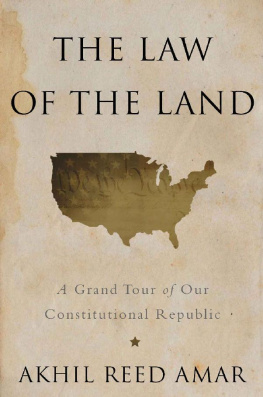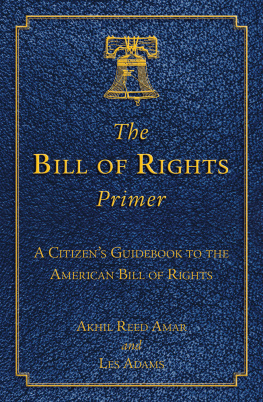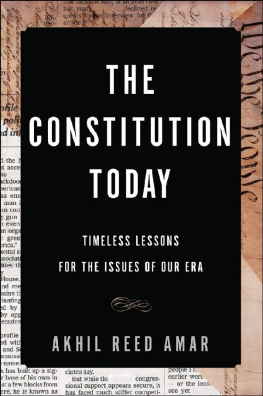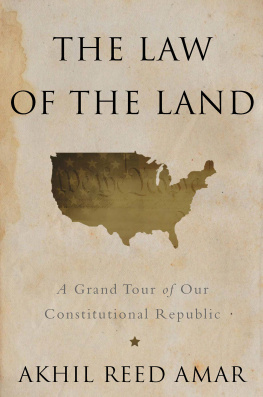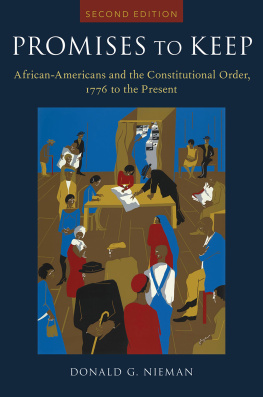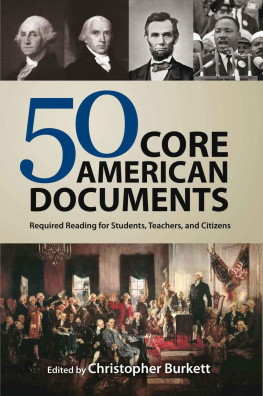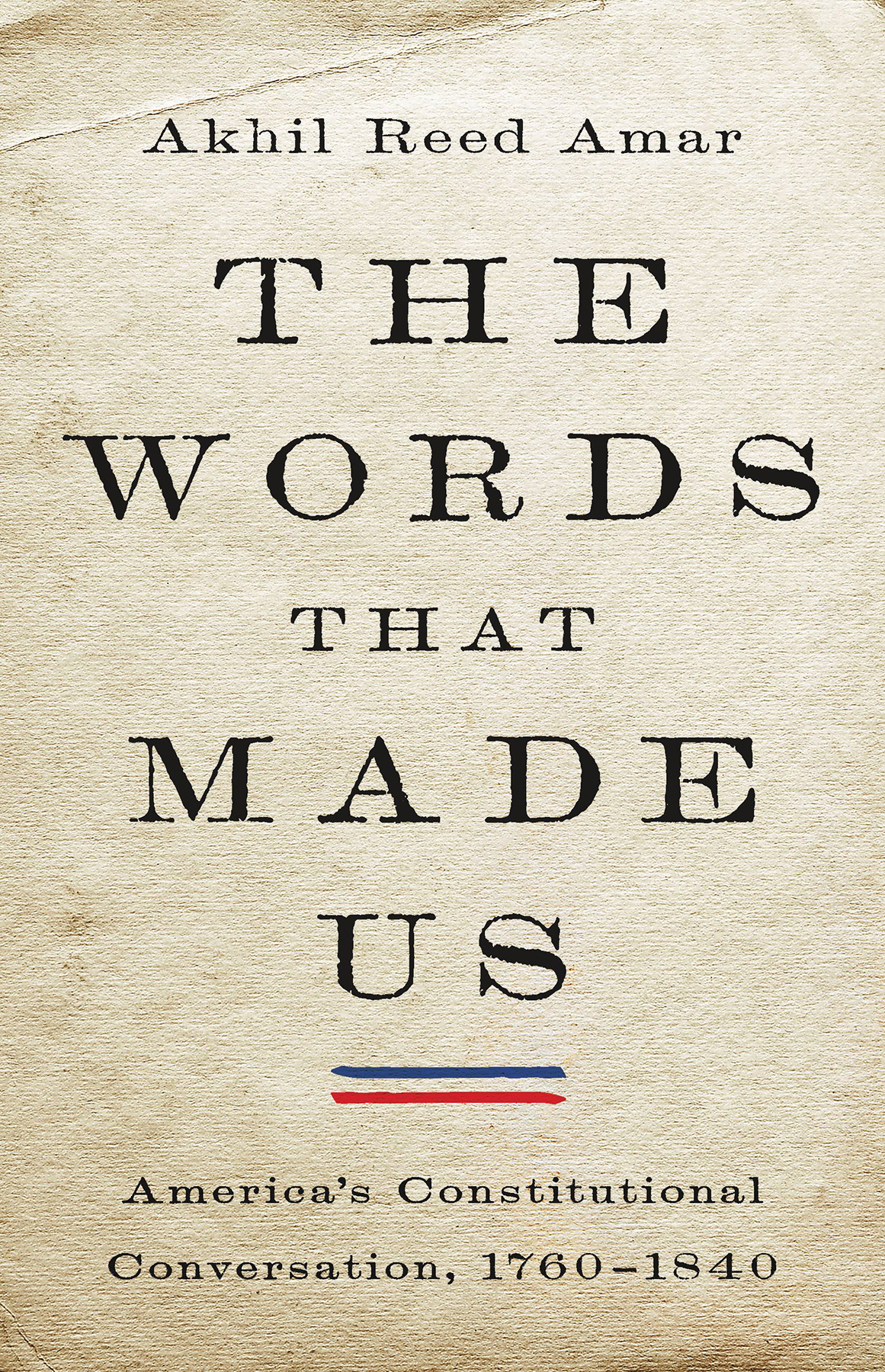
Copyright 2021 by Akhil Reed Amar
Cover design by Chin-Yee Lai
Cover image Valentin Agapov / Shutterstock.com
Cover copyright 2021 by Hachette Book Group, Inc.
Hachette Book Group supports the right to free expression and the value of copyright. The purpose of copyright is to encourage writers and artists to produce the creative works that enrich our culture.
The scanning, uploading, and distribution of this book without permission is a theft of the authors intellectual property. If you would like permission to use material from the book (other than for review purposes), please contact permissions@hbgusa.com. Thank you for your support of the authors rights.
Basic Books
Hachette Book Group
1290 Avenue of the Americas, New York, NY 10104
www.basicbooks.com
First Edition: May 2021
Published by Basic Books, an imprint of Perseus Books, LLC, a subsidiary of Hachette Book Group, Inc. The Basic Books name and logo is a trademark of the Hachette Book Group.
The Hachette Speakers Bureau provides a wide range of authors for speaking events. To find out more, go to www.hachettespeakersbureau.com or call (866) 376-6591.
The publisher is not responsible for websites (or their content) that are not owned by the publisher.
Library of Congress Cataloging-in-Publication Data
Names: Amar, Akhil Reed, author.
Title: The words that made us : Americas constitutional conversation, 17601840 / Akhil Reed Amar.
Description: First edition. | New York : Basic Books, 2021. | Includes bibliographical references and index.
Identifiers: LCCN 2020046037 | ISBN 9780465096350 (hardcover) | ISBN 9780465096367 (epub)
Subjects: LCSH: Constitutional historyUnited States. | Constitutional lawUnited States.
Classification: LCC KF4541 .A878 2021 | DDC 342.7302/9dc23
LC record available at https://lccn.loc.gov/2020046037.
ISBNs: 978-0-465-09635-0 (hardcover), 978-0-465-09636-7 (ebook)
E3-20210409-JV-NF-ORI
Some see history as a series of separate events. Akhil Amar knows, and demonstrates brilliantly, that history overlaps itself, that at each stage we must find (or invent) a usable past from which to shove ourselves into the featureless future. How does one present such a complex back-and-forth use of the past to escape the past? This book shows how.
G ARRY W ILLS , Pulitzer Prizewinning author of Lincoln at Gettysburg
A page-turning doorstop history of how early American courts and politicians interpreted the Constitution. A Yale professor of law and political science, Amarwho points out that most historians lack training in law and most lawyers are not knowledgeable enough about historydelivers a fascinating, often jolting interpretation. Brilliant insights into Americas founding document.
Kirkus (starred review)
The Constitution Today: Timeless Lessons for the Issues of Our Era
The Law of the Land: A Grand Tour of Our Constitutional Republic
Americas Unwritten Constitution: The Precedents and Principles We Live By
Americas Constitution: A Biography
The Bill of Rights: Creation and Reconstruction
The Constitution and Criminal Procedure: First Principles
This book is dedicated to Lin-Manuel Miranda, Vanessa Nadal, Ron Chernow, and Khizr Khan. And of course to Neal Kumar Katyal, who introduced me to each of you. Thank you all, jointly and severally, for helping me and so many others see the true meaning of America.
I N THE REIGN OF G EORGE III, the kings subjects on both sides of the Atlantic began to argue furiously about the nature of government, the structure of empire, the duties of allegiance, and the rights of Englishmen. The heated quarrel eventually came to a boil. Colonial patriots forsook an unworthy ruler, formed new constitutional governments, and forged a fresh legal identity for themselves. The transatlantic Englishmen of 1760 became the Americans of 1776.
But were they Americans first, or should their primary loyalties run to their respective colonies-turned-states? This was the key constitutional question of the next period of American history as the continents leading statesmen pondered whether to remain states men. The federal Constitution that won widespread popular approval in 1788 proclaimed its own answer to this question, an answer reinforced yet gentled by an extraordinary series of ratification conversations and concessions that occurred that fateful year.
As the Constitution launched in 1789, urgent new constitutional questions sprang up in rapid succession and indeed continued to spring up over the next half century. North Carolina and Rhode Island initially refused to ratify. How might President George Washington, flanked by House leader James Madison, entice these states to rejoin their sisters? How should Washington, with Treasury Secretary and Acting Secretary of War Alexander Hamilton at his side, respond to a western Pennsylvania tax rebellion in the early 1790s? When Frances Louisiana territory became available for purchase in 1803, would President Thomas Jefferson need to persuade his fellow citizens to amend their Constitution, or could he do the deal by treaty and statute? Should America allow slavery to spread into any or all of this vast region stretching from New Orleans to Canada? Where did Indian tribes and nontribal Indians fit into the picture? Women? Free Blacks? What about visitors from abroad and foreign-born American citizens? What role should the Constitutions then weakest branch, a federal judiciary led for more than thirty years by Chief Justice John Marshall, play in these conversations?
In each generation, historys kaleidoscope continued to turn and create new patterns of constitutional discourse. Some issues tumbled into view, others fell out of sight, and still others reemerged in vivid new configurations as public servants and private citizens at all levels of government and society participated in a boisterous and sophisticated conversation about legal and political first principles.
This book tells the story of Americas constitutional conversation during its first eighty yearsfrom its birth in 1760 until 1840, just after the last of Americas early constitutional conversationalists died and bequeathed the conversation to posterity.
B UT DO WE REALLY NEED yet another American history bookand a long one at that? I think that we do, else I would not have spent much of my life on the tome that you now hold in your hands.
While history books abound, precious few are wide-angled and multigenerational treatments of the American constitutional project. In recent decades, many great American historians have turned away from institutional and political history and toward social history, exploring the daily lives of our common folk more than the deep logic of our common law or the basic features of our constitutional government. Also, many of the best works of history are period pieces that illuminate a decade or two but do not even try to trace the analytic and narrative threads across the generations. If an exceptionally ambitious modern volume does seek to sweep across three-quarters of a century or more, it typically does so not panoramically but with a tight focus on a single issuesay, chattel slavery or western expansion or sex equality or presidential power.
Consider, for example, two of the biggest bones of constitutional contention in American history: whether a state may ever nullify federal law or secede from the union. Many of the best general history books on the Founding fail even to mention these legal issues. As most professional historians periodize the American saga, these are antebellum era and Civil War topics and thus not central questions for a founding-era historian. Yet many of the right legal answers to the burning issues raised by the South Carolina Nullification Ordinance of 1832 and the secession crisis of 18601861 do in fact reside in the relevant legal materials of 17871788.


